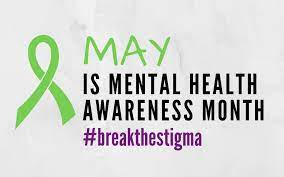Mental Health Awareness Month
May is mental health awareness month, this means that it is a time to break down the stigma around mental health problems and offer support for those who need it. Engaging in honest and vulnerable conversations about mental health are the first step to overcoming the stigma behind these all too common problems. Just as you take care of your physical health by going to the doctors, eating nutritious food, and exercising you must also put the time and care into tending to your mental health.
Here are some ways that you can make a difference this National Mental Health Awareness Month:
1.“Contact your representatives to urge them to prioritize mental health.” (“29 Ways To Celebrate Mental Health Awareness Month (2023)”). A great way to get involved is by contacting your representatives, this is both a great way to get involved in politics if you are unable to vote and also involve yourself in advocacy to spread awareness about mental health.
2. Reach out to a friend. Taking the time to reach out to a friend can completely change someone’s day. They might need it a lot more than you think and your small text or check in might end up helping someone feel just a little bit more seen
3.“Learn more about your mental health.” (“29 Ways To Celebrate Mental Health Awareness Month (2023)”). Reading, listening to podcasts, following social media accounts, or researching on mental health can all be extremely effective in learning about the stigmas surrounding these issues and how to better overcome them.
4.Take time for self care. As important as it is to check in on others and educate yourself on mental health it is equally important to take the time to take care of yourself. Lighting candles and reading a book, watching a movie with friends and family, or going for a run by yourself are just a few ways you can spend time putting energy back into your health.
Mental health is so vital to the overall health of each person and spending time learning more about ways to improve the conversation around its stigma is the first step in becoming closer to creating a safe space for these illnesses.


Sophia is a senior this year who is looking forward to working on the Journalism staff. She is involved in Bellarmine athletics as a track and field athlete,...
